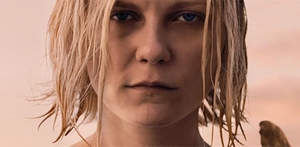Stuart:
The conversation went something like this. Me: “Hey, can we go and see Melancholia?” My girlfriend: “What’s that?” Me: “It’s the new Lars von Trier film.” My girlfriend: “Oh. As in the guy who did Antichrist? No.” Me: “But it’s got Kirsten Dunst in it.” My girlfriend: “You like Kirsten Dunst. Not me.” Me (playing my best card): “Well, it’s got Alexander Skargård in it.” My girlfriend: “Yeah… but… I liked Willem Dafoe too, and he didn’t save Antichrist.”
I should have realised that the fact the film contained Eric from ‘True Blood’ wouldn’t be enough to make her like this film. And whilst Melancholia isn’t as horrid as Antichrist, it will certainly be a divisive film. The concept is strangely similar to Another Earth. A rogue planet is heading towards Earth and the scientists seem to be in disagreement as to whether it’s going to collide or not.
And whilst Melancholia isn’t as horrid as Antichrist, it will certainly be a divisive film. The concept is strangely similar to Another Earth. A rogue planet is heading towards Earth and the scientists seem to be in disagreement as to whether it’s going to collide or not.
Like Another Earth, this high concept sci-fi element is somewhat in the background. Instead we focus on two sisters, Justine (Kirsten Dunst) and Claire (Charlotte Gainsbourg). Justine is a manic-depressive of sorts, and is doing her best to keep things positive during her wedding night. It isn’t easy, however, as her father (the ubiquitous John Hurt) is a drunk embarrassment and her mother (Charlotte Rampling) is terribly negative about marriage and isn’t afraid to vocalise her opinion. Then there’s her brother in law, John (Kiefer Sutherland), a gazillionaire who’s paid for the whole thing but isn’t shy about letting her know just how much everything cost.
In case you hadn’t figured out by now, it’s a stellar cast. Udo Kier and Stellan Skarsgård appear also, in what is one of the most star-laden second acts I’ve seen in a long time. I say second act, because the first is taken up by a series of moving paintings – super slow motion shots that telegraph what is to come. Considering von Trier spent so much of his career shunning cinematic artifice, it’s testament to his versatility as a filmmaker.
Dunst gives the most powerful performance in years. Her depiction of a woman lost in her own depression is gripping and often unpleasant, yet I felt a kind of sympathy for her all the same. After having such a rough time in Antichrist, you wouldn’t think Gainsbourg wouldn’t be up for going through the wringer so soon, but here she is again, being horribly distressed at the prospect that the world may soon end.
Her depiction of a woman lost in her own depression is gripping and often unpleasant, yet I felt a kind of sympathy for her all the same. After having such a rough time in Antichrist, you wouldn’t think Gainsbourg wouldn’t be up for going through the wringer so soon, but here she is again, being horribly distressed at the prospect that the world may soon end.
Von Trier employs Richard Wagner’s ‘Tristan und Isolde, Prelude’ as a recurring motif throughout Melancholia, and whilst the tune is a powerful one, the repetition begins to grate. As usual, he elicits stunning performances from his leading ladies, but von Trier making a film about women having a bad time is kind of like Hitchcock making film about an innocent man wrongly accused – it’s a perennial favourite and something he does best, but one can grow tired of it.
Melancholia will bore and frustrate some. I, for one, found it to be very slow, before building up to an astonishing conclusion that left me breathless. For fans of von Trier, this is a must-see. For everyone else, just make sure you’re in a patient place and up for some doom and gloom.
Oh, and in case you were wondering: my girlfriend hated it. I’ve now got one last chance to prove to her that von Trier is worth the effort, and I’m gonna go for broke with ‘The Kingdom’, which has to be his most purely entertaining work…
Rating: